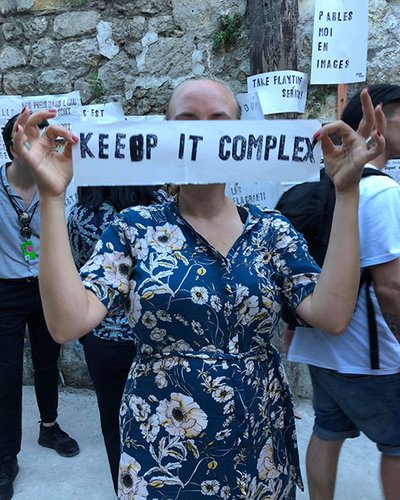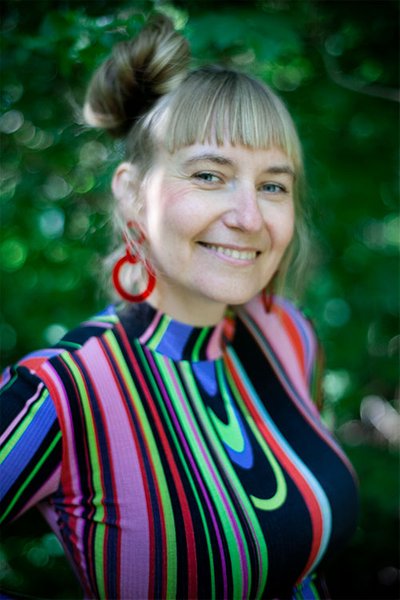The House of Mirrors
Dewi Lewis Publishing 2020
A personal exploration of female sexuality
In the fall of 2017 I went to a swinger club in the city where I live. This was not to work on a project but to expand my idea of myself and my sexuality. What really surprised me was that it was the first time I actually felt safe.
This was the ultimate sexual safe space for a woman. It was a place we could come and have any kind of sex we wanted without the risk of being raped or assaulted. The next thing I noticed was the diversity. Every woman in there was desired; no matter her size, age or other physical quality. And the third thing was that - it was the ultimate free space that allowed a woman to express her sexuality - free from shame and free to explore our lusts and desires.
After spending a considerable time in the club and gaining the trust of the users and the owners, I was able to take my camera with me. I photographed the women in ways that illustrated what I saw, felt and experienced through my journey. In some instances I recreated scenes.
The project is not a documentary about a swingers club. It is a comment on what it is like to exist in a female body in our society
Unravelled
Dewi Lewis Publishing 2014
In Unravelled, Kajsa Gullberg looks at the marks that life makes on us – both the physical and the psychological. Gullberg combines images of women bearing scars on their bodies with those of the natural world – hinting at both a sense of inevitability and our unrealistic dreams of perfection. These women expose themselves, putting on display what our culture seeks to forget – what the culture defines as the imperfect, the ugly and the embarrassing. And yet we need to be loved as we are. Unravelled is made in the hope that the viewer will come to love themselves a little bit more.
The process behind Unravelled started in the summer of 2009, after one of Gullberg’s friends took their lives - soon after the publication of her second book. This period also saw Gullberg leave her husband, breaking away from her family life while intuitively allowing her images to dictate her path. The way was a search of who she was, in that moment, as a human, an artist, a mother and a woman. The path lead through the homes of women she didn’t know before, women whose bodies bore scars. These scars came to symbolize the marks life forces on us.
Gullberg says “I deliberately put myself in situations that make me vulnerable. It makes me remember what it’s like to have pictures taken of yourself. That helps me uncover the traces that bind us together. I’m searching for beauty, strength and pride - where you’d not necessarily expect to find it”
Liminality
Is there a self? Do we have a core that stays intact the whole life? Or are we just a collection of experiences and coincidences? A journey through different random shapes and states? Can I say; this is me?
Liminality comes from the Latin word limen which means “a threshold”. In this context it is referring to the middle stage/state of the three parts of the rite of passage. The rite of passage can be divided into the first part: The Separation where the subject is been separated from its old context or identity, the second part: The Liminal Phase where the subject stands on the threshold of something new and the third part: The Incorporations Phase where the subject integrates and settle in its new context or identity.
Liminality is the dynamic, insecure and sometimes dangerous part of a transformation.
During life, we go through many transformations, some are small and some are groundbreaking. Some are staged like the baptism, marriage and starting/finalizing an education, some are “natural” like parenthood, contracting a serious disease, or falling in love/breaking up. Common with all these transformations is that you can’t return to the state before the transformation and they all contain a time of confusion and irrational behavior.
Eventually this will happen again
2016
The winters in Copenhagen feel like six months of eternal greyness. Darkness and something that’s not really feel like actual daylight. This causes SAD - seasonal affective disorder in many of us. I’m getting nervous in October, angry in November, raging in December and burned out depressed in January and February, angry again in March and in April I’m starting to feel hope again.
I made the Eventually this will happen again-series for an exhibition in February as a reminder and reassurance that there’s hope and it’s a cyklus and resurrection will always happen again
Kajsa Gullberg was born 1977 in Gothenburg, Sweden and has been based in Copenhagen, Denmark since 1996. Through her photographic work she has explored aspects of human existence. Her work is floating over art and documentary, exploring existential topics with socio-political aspects. Her being and doing overlaps and her processes are both practical experience and theoretically based.























































